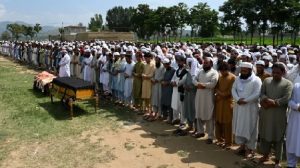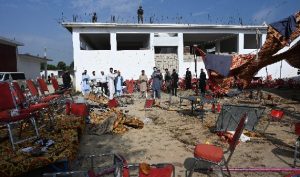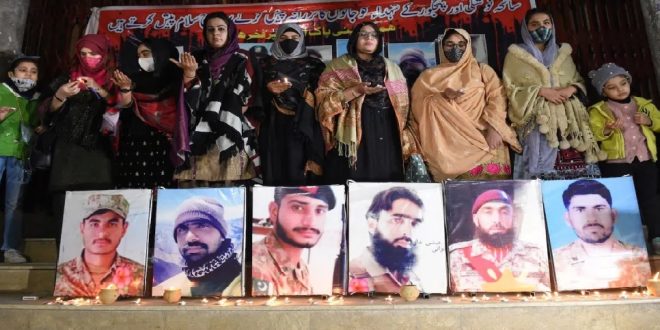03-08-2023
By SJA Jafri + Bureau Report
PESHAWAR/ KARACHI: The deadly July suicide bombing at a political rally in Pakistan’s northwestern province of Khyber Pakhtunkhwa highlights a troublesome trend of violence in the region.
The bombing on Sunday targeted those attending a rally for the religious political party Jamiat Uleme-e-Islam-Fazal (JUIF) in the tribal district of Bajaur, some 130km (80 miles) from Peshawar which is the provincial capital.
 At least 54 people were killed and 200 were injured in the attack, making July the second most deadly month in Pakistan this year, according to the Pakistan Institute for Conflict and Security Studies (PICSS), an Islamabad-based research organization.
At least 54 people were killed and 200 were injured in the attack, making July the second most deadly month in Pakistan this year, according to the Pakistan Institute for Conflict and Security Studies (PICSS), an Islamabad-based research organization.
Shortly afterwards, ISIL (ISIS) claimed responsibility for this attack, which according to researcher Ricardo Valle, fits with the “long history” of enmity between the Islamic State in Khorasan Province, ISKP (ISIS-K), the regional affiliate of ISIL, and Bajaur’s JUIF that dates back to at least 2019.
“In IS-K’s (ISIS-K’s) eyes, the JUIF supports democracy, believes in a republican system instead of an Islamic one, and believes in national states instead of the Ummah,” said Valle, director of research for The Khorasan Diary, a non-partisan research platform.
“Furthermore, IS-K believes that JUIF is the political arm of the Afghan Taliban in Pakistan, considering them close allies,” the Islamabad-based scholar told media on Tuesday.
Valle said IS-K issued a series of fatwas (Islamic rulings) last year, calling for the assassinations of JUIF religious scholars and activists.
However, according to Asfandyar Mir, a South Asia expert at the United States Institute of Peace (USIP), the reason behind Sunday’s attack could be more complicated.
 “There are multiple motives at play here. IS-K is driven by the logic of outbidding in the competitive militant landscape of the region. The group asserts itself through large-scale attacks,” he told media.
“There are multiple motives at play here. IS-K is driven by the logic of outbidding in the competitive militant landscape of the region. The group asserts itself through large-scale attacks,” he told media.
Mir, however, adds that perhaps actions against JUIF were also driven by their support for the Afghan Taliban’s operations against IS-K.
Regardless of the reasons, the bombing in Bajaur is just the latest in an increasing trend of violent incidents this year.
According to PICSS, Pakistan saw “a staggering 79 percent increase in militant attacks during the first half of this year compared with the corresponding period last year”.
Most attacks occurred in the country’s Khyber Pakhtunkhwa province and its tribal districts. It is followed by incidents in the southwestern province of Balochistan, where a nationalist armed campaign has been continuing for years.
More than 100 people were killed in January this year when a suicide bomber targeted a mosque in Peshawar’s police lines area. February saw armed fighters target a key police office in the southern city of Karachi in an attack that lasted for hours and killed at least five people. Another large-scale attack unfolded in the Swat area of Khyber Pakhtunkhwa in April when attackers targeted a counterterrorism office, which resulted in the death of 17 people.
 Pressmediaofindia
Pressmediaofindia




